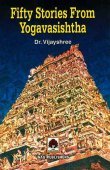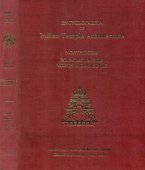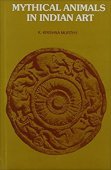Ikshvaku, Ikṣvāku, Īkṣvāku: 26 definitions
Introduction:
Ikshvaku means something in Buddhism, Pali, Hinduism, Sanskrit, Jainism, Prakrit, the history of ancient India, Tamil. If you want to know the exact meaning, history, etymology or English translation of this term then check out the descriptions on this page. Add your comment or reference to a book if you want to contribute to this summary article.
The Sanskrit terms Ikṣvāku and Īkṣvāku can be transliterated into English as Iksvaku or Ikshvaku, using the IAST transliteration scheme (?).
In Hinduism
Purana and Itihasa (epic history)
Source: Wisdom Library: Bhagavata PuranaIkṣvāku (इक्ष्वाकु):—One of the ten sons of Śrāddhadeva (current Manu) and Śraddhā. King Ikṣvāku had one hundred sons, of whom Vikukṣi, Nimi and Daṇḍakā were the most prominent. (see Bhāgavata Purāṇa 9.6.4)
Source: archive.org: Puranic EncyclopediaIkṣvāku (इक्ष्वाकु).—* A son of Vaivasvata Manu. Genealogy. From Viṣṇu were descended in the following order—Brahmā—Marīci—Kaśyapa—Vivasvān -Vaivasvata Manu—Ikṣvāku. (See full article at Story of Ikṣvāku from the Puranic encyclopaedia by Vettam Mani)
Source: Cologne Digital Sanskrit Dictionaries: The Purana IndexIkṣvāku (इक्ष्वाकु).—One of the ten (nine, Brahmāṇḍa-purāṇa) sons of Vaivasvata Manu. Born of his sneezing.1 Father of a hundred sons—Vikukṣi, Nimi, Daṇḍa and others. 25 of these sons ruled Āryāvarta, 25, the western territory, three, the middle country and the rest all other provinces. Once in connection with an aṣṭaka ritual, Vikukṣi was asked to secure some flesh. Accordingly he did. But feeling hungry he partook a part of hare's flesh. When the remainder was presented, the purohita refused to take it on the ground that it was remainder of that already tasted. Vikukṣi was therefore punished with banishment. It is said that he became a yogin and attained salvation.2 A king known for his exemplary protection of his subjects. Parīkṣit compared to him.3 Prominent kings of his line.4 Knew the power of Hari's yoga, and in his line Hari incarnated.5 Sumitra was the last Kṣatriya king of this line.6 Originator of the solar race; the genealogy given down to Śantāyu of the Bhārata war.7 Heard from Vasiṣṭha of Ila's conversion to the other sex in the Śaravaṇa forest and performed aśvamedha by which Ila was turned into a Kimpuruṣa.8 Was addressed by the Pitṛs in Kalāpa forest on the effect of offering śrāddha at Gayā.9 The line of.10 Had 100 branches.11
- 1) Bhāgavata-purāṇa VIII. 13. 2; IX. 1. 3 and 12; 2. 2; Vāyu-purāṇa 64. 29; 85. 4; 88. 9; Viṣṇu-purāṇa IV. 1. 7; Brahmāṇḍa-purāṇa II. 38. 30; III. 60. 2 and 20; 63. 8; Matsya-purāṇa 9. 30; 11. 41.
- 2) Bhāgavata-purāṇa IX. 6. 4-10; Viṣṇu-purāṇa IV. 2. 15-18.
- 3) Bhāgavata-purāṇa I. 12. 19.
- 4) Matsya-purāṇa 12. 15-56; Vāyu-purāṇa 99. 280-290.
- 5) Bhāgavata-purāṇa II. 7. 23 and 44; XII. 2. 37;
- 6) Brahmāṇḍa-purāṇa III. 74. 244; Matsya-purāṇa 273. 53; Vāyu-purāṇa 99. 266 and 431.
- 7) Matsya-purāṇa 12. 15-56.
- 8) Matsya-purāṇa 12. 1-15.
- 9) Viṣṇu-purāṇa III. 1. 33; 16. 17-18.
- 10) Vāyu-purāṇa 1. 142; 88. 175-184; Viṣṇu-purāṇa IV. 22. 1-13.
- 11) Vāyu-purāṇa 99. 451.
Īkṣvāku (ईक्ष्वाकु) is a name mentioned in the Mahābhārata (cf. I.70.13) and represents one of the many proper names used for people and places. Note: The Mahābhārata (mentioning Īkṣvāku) is a Sanskrit epic poem consisting of 100,000 ślokas (metrical verses) and is over 2000 years old.
Source: Shodhganga: The saurapurana - a critical studyIkṣvāku (इक्ष्वाकु) refers to one of the nine sons of Manu Vaivasvata: the son of Saṃjñā and Bhāskara (sun-god), according to the Vaṃśānucarita section of the 10th century Saurapurāṇa: one of the various Upapurāṇas depicting Śaivism.—Accordingly, [...] It is stated that Aditi got from Kaśyapa, Bhāskara, the Sun-god. The Sun-god had four wives [viz., Saṃjñā]. Saṃjñā gave birth to Manu from the sun-god in whose race were born the kings (viz., Ikṣvāku). [...] Vikukṣi was the son of Ikṣvāku. He had hundred sons of whom Kakutstha was the eldest.

The Purana (पुराण, purāṇas) refers to Sanskrit literature preserving ancient India’s vast cultural history, including historical legends, religious ceremonies, various arts and sciences. The eighteen mahapuranas total over 400,000 shlokas (metrical couplets) and date to at least several centuries BCE.
Vaishnavism (Vaishava dharma)
Source: ISKCON Press: Glossary1) Ikṣvāku (इक्ष्वाकु).—The son of Manu who was king of the earth in ancient times and to whom Manu spoke Bhagavad-gītā.
2) Ikṣvāku (इक्ष्वाकु).—The son of the sun-god, Vivasvān, and the first king of the earth planet.
Īkṣvāku (ईक्ष्वाकु) refers to “the son of Vivasvān the sun-god; Earth’s first king”. (cf. Glossary page from Śrīmad-Bhagavad-Gītā).
Source: Pure Bhakti: Brhad BhagavatamrtamIkṣvāku (इक्ष्वाकु) refers to:—The son of Vaivasvata Manu, who was the first king of the earth. (cf. Glossary page from Śrī Bṛhad-bhāgavatāmṛta).

Vaishnava (वैष्णव, vaiṣṇava) or vaishnavism (vaiṣṇavism) represents a tradition of Hinduism worshipping Vishnu as the supreme Lord. Similar to the Shaktism and Shaivism traditions, Vaishnavism also developed as an individual movement, famous for its exposition of the dashavatara (‘ten avatars of Vishnu’).
Ayurveda (science of life)
Kalpa (Formulas, Drug prescriptions and other Medicinal preparations)
Source: Shodhganga: Edition translation and critical study of yogasarasamgrahaIkṣvāku (इक्ष्वाकु) refers to the medicinal plant known as “Lagenaria siceraria (Mol.) Standley” and is dealt with in the 15th-century Yogasārasaṅgraha (Yogasara-saṅgraha) by Vāsudeva: an unpublished Keralite work representing an Ayurvedic compendium of medicinal recipes. The Yogasārasaṃgraha [mentioning ikṣvāku] deals with entire recipes in the route of administration, and thus deals with the knowledge of pharmacy (bhaiṣajya-kalpanā) which is a branch of pharmacology (dravyaguṇa).

Āyurveda (आयुर्वेद, ayurveda) is a branch of Indian science dealing with medicine, herbalism, taxology, anatomy, surgery, alchemy and related topics. Traditional practice of Āyurveda in ancient India dates back to at least the first millenium BC. Literature is commonly written in Sanskrit using various poetic metres.
Jyotisha (astronomy and astrology)
Source: Wisdom Library: Brihat Samhita by VarahamihiraIkṣvāku (इक्ष्वाकु) refers to an ancient kingdom or tribe of people, according to the Bṛhatsaṃhitā (chapter 5), an encyclopedic Sanskrit work written by Varāhamihira mainly focusing on the science of ancient Indian astronomy astronomy (Jyotiṣa).—Accordingly, “If there should be both lunar and solar eclipses in one month, princes will suffer both from dissensions among their own army and from wars. [...] If the eclipses should fall in the lunar month of Vaiśākha cotton, gingelly and beans will be injured; the Ikṣvākus, the Yaudheyas, the Śakas and the Kaliṅgas will suffer; but there will be prosperity over the land”.

Jyotisha (ज्योतिष, jyotiṣa or jyotish) refers to ‘astronomy’ or “Vedic astrology” and represents the fifth of the six Vedangas (additional sciences to be studied along with the Vedas). Jyotisha concerns itself with the study and prediction of the movements of celestial bodies, in order to calculate the auspicious time for rituals and ceremonies.
General definition (in Hinduism)
Source: Apam Napat: Indian MythologyIkshvaku was one of the kings of the Surya dynasty, and an ancestor of Sri Rama, the hero of the epic Ramayana. His father was Manu, the son of Vivasvant, the sun god. Ikshvaku was succeeded by his son Kukshi.
Source: WikiPedia: HinduismIkshvaku (इक्ष्वाकु): The word Ikshvaku means "bitter gourd". Ikshvaku was the first king and founder of the Sun Dynasty in Vedic civilization in ancient India. He was the son of Manu (the first man on earth), sired by the Sun God, Surya. Rama, of the epic Ramayana is a descendant of the house of Ikshvaku. So are Bhagiratha, Dasaratha, Luv and Kusa.
In Buddhism
General definition (in Buddhism)
Source: Wisdom Library: BuddhismIkṣvāku (इक्ष्वाकु) (surnamed Sujāta) is the name of an ancient king from the Solar dynasty (sūryavaṃśa) and a descendant of Mahāsaṃmata, according to the Mahāvastu of the Mahāsaṃghikas (and the Lokottaravāda school). Ikṣvāku is also mentioned in the Dulva (the Tibetan translation of the Vinaya of the Sarvāstivādins). Ikṣvāku is known as Okkāka according to the Dīpavaṃśa and the Mahāvaṃśa.
In Jainism
General definition (in Jainism)
Source: archive.org: Trisastisalakapurusacaritra1) Ikṣvāku (इक्ष्वाकु) is the family-name of Ṛṣabha, as explained in chapter 1.2 [ādīśvara-caritra] of Hemacandra’s 11th century Triṣaṣṭiśalākāpuruṣacaritra: an ancient Sanskrit epic poem narrating the history and legends of sixty-three illustrious persons in Jainism.
Accordingly, “[...] A little less than a year after the Lord’s birth, the Vāsava of Saudharma came with the object of establishing a family-line. As if with the thought, ‘A servant, empty-handed, must not see the Master’, he took a large stalk of sugar-cane. Sunāsīra with the stalk of sugar-cane like autumn-time personified, went before the Master seated on Nābhi’s lap. The Lord, having known Śakra’s intention by clairvoyant knowledge, raised his hand, like an elephant its trunk, to take the stalk of sugar-cane. Bending his head, knowing the Master’s intention, Śakra gave the shoot of sugar-cane like a present. Then the Lord-of-the-sky went to heaven, having established the Master’s family with the name ‘Ikṣvāku’, because the sugar-cane was taken by the Lord. [...]”.
2) Ikṣvāku (इक्ष्वाकु) refers to a sub-division of the Jātyārya class of Āryas (one of the two types of human beings), taking birth in the “middle world” (madhyaloka), according to chapter 2.3.—Accordingly, “In these 35 zones on this side of Mānuṣottara and in the Antaradvīpas, men arise by birth; [...]. From the division into Āryas and Mlecchas they are two-fold. The Āryas have sub-divisions: kṣetra (country), jāti (caste), kula (family), karma (work), śilpa (craft), and bhāṣā (language). [...] The Jātyāryas are the Ikṣvākus, Jñātas, Haris, Videhas, Kurus, Ugras, Bhojas, and Rājanyas”.

Jainism is an Indian religion of Dharma whose doctrine revolves around harmlessness (ahimsa) towards every living being. The two major branches (Digambara and Svetambara) of Jainism stimulate self-control (or, shramana, ‘self-reliance’) and spiritual development through a path of peace for the soul to progess to the ultimate goal.
India history and geography
Source: Singhi Jain Series: Ratnaprabha-suri’s Kuvalayamala-katha (history)Ikshvaku refers to a dynasty of Kings, as depicted in the Kathās (narrative poems) such as Uddyotanasūri in his 8th-century Kuvalayamālā (a Prakrit Campū, similar to Kāvya poetry).—Page 135.6: There is a reference to Vijayā Mahāpurī which was situated on the sea shore and the same as Nagarjuna Kunda, the famous capital of the Ikshvaku kings as stated in their inscriptions. It seems to be a historical fact that the monument of Vijayāpurī stood intact and the place enjoyed wide celebrity. The leader of the caravan was one Vaiśramaṇadatta. There follows (lines 27 f.) a description of the attack on the Sārtha and its plunder by wild Bhillas.

The history of India traces the identification of countries, villages, towns and other regions of India, as well as mythology, zoology, royal dynasties, rulers, tribes, local festivities and traditions and regional languages. Ancient India enjoyed religious freedom and encourages the path of Dharma, a concept common to Buddhism, Hinduism, and Jainism.
Languages of India and abroad
Sanskrit dictionary
Source: DDSA: The practical Sanskrit-English dictionaryIkṣvāku (इक्ष्वाकु).—
1) Name of the celebrated ancestor of the Solar kings who ruled in Ayodhyā; (he was the first of the Solar kings and was a son of Manu Vaivasvata; (cf. Bhāg. kṣuvatastu manorjajña ikṣvākurghāṇataḥ sutaḥ); इक्ष्वाकुवंशोऽभि- मतः प्रजानाम् (ikṣvākuvaṃśo'bhi- mataḥ prajānām) Uttararāmacarita 1.44.
2) (pl.) Descendants of Ikṣvāku; गलितवयसामिक्ष्वाकूणामिदं हि कुलव्रतम् (galitavayasāmikṣvākūṇāmidaṃ hi kulavratam) R.3.7.
-kruḥ f. A kind of bitter gourd, Cucurbita Lagenaria (Mar. kaḍū dudhyā).
Derivable forms: ikṣvākuḥ (इक्ष्वाकुः).
Source: Cologne Digital Sanskrit Dictionaries: Edgerton Buddhist Hybrid Sanskrit DictionaryIkṣvāku (इक्ष्वाकु).—(= Pali Okkāka 2, Malalasekara (Dictionary of Pali Proper Names)), name of a legendary king, son of Subandhu and father of Kuśa, named from his birth from a sugar-cane plant: Mahāvastu ii.422.20 ff.; iii.1.1 ff.
Source: Cologne Digital Sanskrit Dictionaries: Shabda-Sagara Sanskrit-English DictionaryIkṣvāku (इक्ष्वाकु).—m.
(-kuḥ) The son of the Manu Naivaswata, the son of Surya or the sun, and first prince of the solar dynasty: he reigned at Ajodhya in the commencement of the second Yuga or age. f.
(-kuḥ) A bitter gourd. E. ikṣu and aka to obtain, and ku or uṇ aff.
Source: Cologne Digital Sanskrit Dictionaries: Benfey Sanskrit-English DictionaryIkṣvāku (इक्ष्वाकु).—m. 1. The name of the first king of Ayodhya, [Rāmāyaṇa] 1, 70, 20. 2. A descendant of that king, [Rāmāyaṇa] 1, 70, 11.
Source: Cologne Digital Sanskrit Dictionaries: Cappeller Sanskrit-English DictionaryIkṣvāku (इक्ष्वाकु).—[masculine] [Name] of a king & his descendants.
Source: Cologne Digital Sanskrit Dictionaries: Monier-Williams Sanskrit-English Dictionary1) Ikṣvāku (इक्ष्वाकु):—m. ([Ṛg-veda]) and ikṣvāku ([Atharva-veda]). Name of a man, [Ṛg-veda x, 60, 7; Atharva-veda xix, 39, 9]
2) of a son of Manu Vaivasvata (father of Kukṣi and first king of the solar dynasty in Ayodhyā), [Mahābhārata; Rāmāyaṇa; Bhagavad-gītā; Harivaṃśa; Viṣṇu-purāṇa]
3) a descendant of Ikṣvāku, [Rāmāyaṇa; Raghuvaṃśa]
4) (some Buddhists as well as the Jainas derive their Cakravartins and many of their Arhats from Ikṣvāku)
5) (avas) Name of a warrior-tribe descended from Ikṣvāku, [Varāha-mihira’s Bṛhat-saṃhitā]
6) f. (us) a bitter gourd
7) according to some, the Coloquintida (Citrillus Colocynthis), the fruit of a wild species of Lagenaria Vulgaris, [Suśruta]
Source: Cologne Digital Sanskrit Dictionaries: Yates Sanskrit-English DictionaryIkṣvāku (इक्ष्वाकु):—(kuḥ) 2. m. The lst monarch of the Hindus. f. A bitter gourd.
Source: DDSA: Paia-sadda-mahannavo; a comprehensive Prakrit Hindi dictionary (S)Ikṣvāku (इक्ष्वाकु) in the Sanskrit language is related to the Prakrit words: Ikkhāga, Ikkhāgu.
[Sanskrit to German]
Sanskrit, also spelled संस्कृतम् (saṃskṛtam), is an ancient language of India commonly seen as the grandmother of the Indo-European language family (even English!). Closely allied with Prakrit and Pali, Sanskrit is more exhaustive in both grammar and terms and has the most extensive collection of literature in the world, greatly surpassing its sister-languages Greek and Latin.
Kannada-English dictionary
Source: Alar: Kannada-English corpusIkṣvāku (ಇಕ್ಷ್ವಾಕು):—[noun] the plant Lagenaria vulgaris (=L. speciosa, = Cucurbita lagenaria) of Cucurbitaceae family; calabash; bitter gourd; (myth.) name of a king in Solar dynasty.
Kannada is a Dravidian language (as opposed to the Indo-European language family) mainly spoken in the southwestern region of India.
See also (Relevant definitions)
Starts with: Ikshvakucandramas, Ikshvakukulaja, Ikshvakukulanandana.
Ends with: Aikshvaku.
Full-text (+283): Aikshvaka, Vikukshi, Nimi, Dashashva, Ikkhaga, Kalmashapada, Mahabhisha, Ulkamukha, Shashada, Vrishabhasvamin, Madirashva, Anaranya, Saudasa, Nabhas, Aikshvakava, Ikshvakukulaja, Aranya, Sumitra, Ikshvakucandramas, Arankam.
Relevant text
Search found 84 books and stories containing Ikshvaku, Ikṣvāku, Iksvaku, Īkṣvāku; (plurals include: Ikshvakus, Ikṣvākus, Iksvakus, Īkṣvākus). You can also click to the full overview containing English textual excerpts. Below are direct links for the most relevant articles:
Rig Veda (translation and commentary) (by H. H. Wilson)
List of Mahabharata people and places (by Laxman Burdak)
Bhakti-rasamrta-sindhu (by Śrīla Rūpa Gosvāmī)
Verse 3.2.29 < [Part 2 - Affection and Service (dāsya-rasa)]
Verse 3.2.97 < [Part 2 - Affection and Service (dāsya-rasa)]
Ramayana of Valmiki (by Hari Prasad Shastri)
Chapter 55 - The Story of Nimi < [Book 7 - Uttara-kanda]
Chapter 19 - Ravana fights with Anaranya < [Book 7 - Uttara-kanda]
Chapter 57 - The End of the Story of Vasishtha and Nimi < [Book 7 - Uttara-kanda]
Amaravati Art in the Context of Andhra Archaeology (by Sreyashi Ray chowdhuri)
Region Beyond The Coastal Lines (2): Nelakoṇḍapalli < [Chapter 2 - Amarāvatī and other Archaeological Sites of Ancient Andhra Pradesh]
Lower Kṛṣṇā Valley (8): Nāgārjunakoṇḍa < [Chapter 2 - Amarāvatī and other Archaeological Sites of Ancient Andhra Pradesh]
Lower Kṛṣṇā Valley (19): Yeleśvaram < [Chapter 2 - Amarāvatī and other Archaeological Sites of Ancient Andhra Pradesh]
Charaka Samhita (English translation) (by Shree Gulabkunverba Ayurvedic Society)
Chapter 3 - The Pharmaceutics of the Bottle Gourd (ikshvaku-kalpa) < [Kalpasthana (Kalpa Sthana) — Section on Pharmaceutics]
Chapter 19 - The therapeutics of Diarrhea (atisara-cikitsa) < [Cikitsasthana (Cikitsa Sthana) — Section on Therapeutics]
Related products





